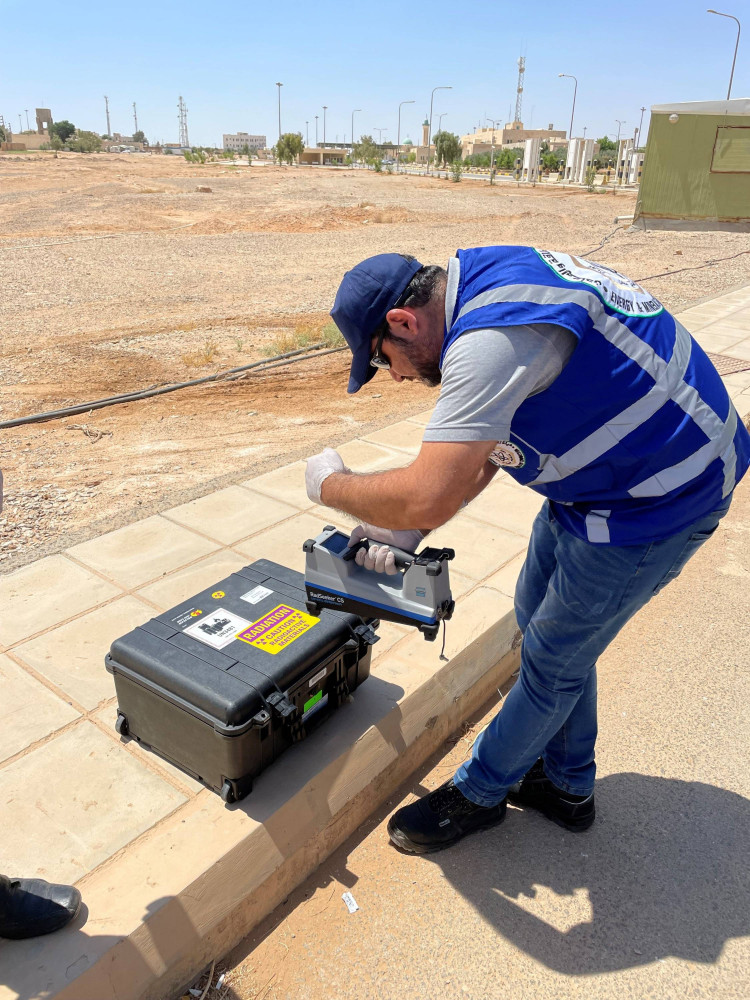An International Atomic Energy Agency (IAEA) team of experts has completed a nuclear security mission in Jordan. The team said Jordan had made progress in strengthening the country’s nuclear security infrastructure set up to prevent and detect nuclear and other radioactive material out of regulatory control. It encouraged Jordan to further improve its nuclear security capabilities.
The International Nuclear Security Advisory Service (INSServ), conducted from 20 to 30 June, was the first such IAEA mission in Jordan with the aim to help identify measures needed to prevent, detect and respond to criminal and other intentional unauthorized acts involving nuclear and other radioactive material out of regulatory control. The mission was carried out at the request of the Government of Jordan and hosted by the Energy and Minerals Regulatory Commission (EMRC), the national nuclear regulator.
INSServ missions focus on nuclear and other radioactive material reported out of regulatory control. This can be caused by theft, improper disposal or negligence. Jordan uses radioactive sources in medicine, industry, research.
The ten-days mission was conducted in a new format, which is based on the revised INSServ guidelines published by the IAEA in May 2019. The guidelines establish a more flexible approach, which can be tailored to accommodate individual national contexts.
Based on these guidelines, the team reviewed Jordan’s legislative and regulatory arrangements for nuclear security, the roles and responsibilities of the competent authority for nuclear security, the coordination between stakeholders, and arrangements for national nuclear security detection and response systems.
The team was led by Frederic Mariotte, Nuclear Counsellor at the Permanent Mission of France to the United Nations and International Organizations in Vienna, and included five other experts from Argentina, Japan, Malaysia, the United States of America, and the IAEA.
As part of the mission, the INSServ team met in the capital Amman with senior officials from the National Nuclear Security Committee, the coordinating body for all competent authorities with a role in Jordan’s nuclear security, as well as from ministries and other governmental bodies. The team also conducted interviews with front line officers and observed detection operations at an airport, a land border crossing, and a seaport. The mission included a visit to the National Communication System and Emergency and Monitoring Centre to follow up on Jordan’s nuclear security response framework.
The INSServ team observed that Jordan had made a significant progress in strengthening its nuclear security capabilities, including during major public events such as sporting events. The team provided recommendations and suggestions to support Jordan in further enhancing and sustaining nuclear security.
Good practices including a strategy for sustainability were identified in Jordan’s nuclear security regime that can serve as examples to other IAEA Member States to help strengthen their nuclear security activities. In particular, the INSServ team recognized as a good practice the establishment of the National Centre for Nuclear and Radiological Security that can continuously review and update the legislative and regulatory framework for nuclear security relevant to nuclear and other radioactive material reported out of regulatory control.
“By requesting an INSServ mission, Jordan has demonstrated its openness to receive an assessment of the country’s capabilities and practices in relevant parts of nuclear security,” said Elena Buglova, Director of the IAEA Division of Nuclear Security. “Having in place radiation detection infrastructure and being able to assess alarms and alerts about material that has been reported as being out of regulatory control, as well as of material that is lost, missing or stolen, is essential part of work in this area”.
“We requested the INSServ mission because Jordan has worked hard on our detection and response framework. We are glad to receive recommendations from this independent evaluation by internationally recognized experts so that we can follow up and improve our nuclear security capabilities”, said. Luai Al Kiswani, Director of Nuclear Security, Energy & Minerals Regulatory Commission, Jordan.
Background
The mission was the 81st INSServ mission conducted by the IAEA since the programme began in 2006.
INSServ missions are intended to assist States in establishing, maintaining and strengthening their nuclear security regime related to nuclear and other radioactive material out of regulatory control.
The missions provide independent advice on implementing international instruments, along with IAEA guidance on the prevention and detection of and response to criminal and intentional unauthorized acts involving nuclear and other radioactive material out of regulatory control.


